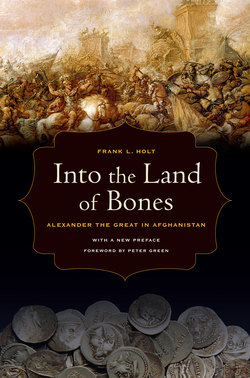Читать книгу Into the Land of Bones - Frank L. Holt - Страница 10
На сайте Литреса книга снята с продажи.
ОглавлениеPREFACE
ALEXANDER AND AFGHANISTAN
SINCE AUGUST 2004
Numbers often numb us, but they have an inescapable precision that mere words cannot match. Consider, for example, the headline “War Grinds on in Afghanistan” compared to the figure 2,665—and counting, the number of coalition deaths in that conflict since Into the Land of Bones first appeared in print. This second preface can only, sadly, confirm in stark numbers the predictions of the first: “The experiences of Alexander the Great, though long ago, still resonate, and they suggest that America’s resolve will be sorely tested in that truculent land. Even now, three years later, the war is not over.” Since those words were written, this has become the longest war in U.S. history and coalition deaths in Afghanistan have increased 15-fold. In addition, at least 13,993 American troops have been wounded there since August 2004, compared to 349 previously. Civilian casualties reached record highs in 2010–2011.
Numbers also tell the story of the pivotal event in this modern conflict, namely the much-debated surge of some 30,000 troops announced by President Barack Obama in late 2009. Few who had not read Into the Land of Bones might have noticed the remarkable parallel to the troop surge of 22,000 Greeks received by Alexander the Great 2,337 years earlier in 329 bce. Both surges claimed some success, at least sufficient to justify a substantial later withdrawal of weary forces under the name of Victory. Even so, Alexander left about 13,500 reluctant Greek soldiers plus another 10,000 settlers in what is now Afghanistan; it remains to be seen what number will be required of the U.S. military and the dozens of NGOs on the ground. Meanwhile, the messy end-game is already taking shape, with something of an international scramble to wrangle “post-war” access to Afghanistan’s vast mineral resources: gold, copper, iron, lithium, and more. Indeed, there has not been a similar mining boom in this underdeveloped region since—mirabile dictu—the Hellenistic years following Alexander’s campaigns, when massive wealth was dug from the mountainous spine of Afghanistan to manufacture tons of ancient money. The experiences of Alexander still resonate throughout the region, probably more so now than 88 months ago.
Think also of 311, the number of publications devoted to Alexander’s life and legacy that have appeared since August 2004. This statistic reflects the staying power of Alexander in our modern consciousness. These works include biographies, military studies, leadership manuals, and a steady flow of academic articles in journals one might expect (e.g., Historia) as well as some notable surprises (e.g., Journal of the History of Neurosciences). There has even appeared a novelized account of Alexander’s war in Central Asia (Steven Pressfield’s The Afghan Campaign), a bit of fiction I am saving for retirement. The rest I have read with much profit, particularly Shaul Shaked’s Le satrape de Bactriane et son gouverneur: Documents araméens du IVe s. avant notre ère (Diffusion de Boccard, 2004). This trim book introduces to scholars a number of Aramaic administrative documents found somewhere in Afghanistan. They clearly reveal details about, inter alia, the affairs of Bessus/Artaxerxes and Alexander before, during, and after their conflict. These texts mention dates, places, administrative subordinates, and provisions. The prospects for more such information remain high and may someday allow a much richer narrative than can now be imagined.
Finally, consider the numbers three and four: Into the Land of Bones was my third book published with University of California Press, and I am grateful to classics editor Eric A. Schmidt for providing this opportunity to issue a corrected edition. I thank the readers and reviewers, especially Paul Cartledge, for bringing these corrigenda to my attention. I also express my gratitude to Peter Green for agreeing to write the foreword. For those interested in the fate of the Greeks in ancient Afghanistan and the extraordinary means by which their story can be told, I signal here the imminent release of my fourth book with University of California Press, Lost World of the Golden King: In Search of Ancient Afghanistan.
Houston, Texas December 2011
